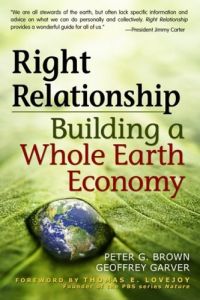Acesse a sua conta getAbstract para obter o resumo!

Acesse a sua conta getAbstract para obter o resumo!
Peter G. Brown and Geoffrey Garver
Right Relationship
Building a Whole Earth Economy
Berrett-Koehler, 2009
Sobre o que é?
An economic look at environmentalism: Why society must align with Earth’s needs and end its devotion to growth and greed.
Recommendation
Many books decry human greed, describe the degradation of the environment and end with a few short pages recommending reform. This isn’t that type of book. Instead, from the first page, Canadian environmentalists Peter G. Brown and Geoffrey Garver agitate for a revolution in the way people use natural resources. They present an admirably solid case that the relationship between the Earth and the global economy must change, and soon. Whether their idealistic prescription (global governance institutions?) is realistic, however, remains to be seen. getAbstract recommends this book to leaders who seek a fresh perspective on sustainability and the economy.
Summary
About the Authors
Peter G. Brown, Ph.D., is a professor at McGill University’s School of Environment, and author of Restoring the Public Trust and Ethics, Economics, and International Relations (published in North America as The Commonwealth of Life). Geoffrey Garver is an environmental consultant in Montreal and a trustee of the Quaker Institute for the Future.



















Comment on this summary